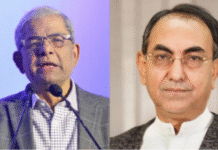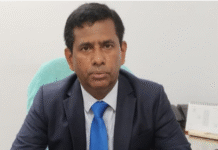Complaints of noise fall on deaf ears

Loud construction at night causes disquiet in Dhaka as no one takes responsibility
Overnight construction work has long been a common practice and continues to cause nuisance in Dhaka, a city already devastated by crippling gridlocks and extreme noise pollution during the day time.
Public awareness about regulations regarding construction work and what is permissible is generally absent. With much more pressing problems overwhelming public life in Dhaka, construction work at night doesn’t seem to register with the jaded population of the ‘second least liveable city in the world’.
Yet, it does cause distress to many people. Night time construction is one of the most frequent issues reported to Bangladesh Environmental Lawyers Association (BELA) by aggrieved individuals.
Even though the ailing, elderly and children are especially affected, loud construction work during the quiet of night time can disturb sleep and peace for anyone in a residential area, which is the case for Star Faruque, who lives in Baridhara Diplomatic Zone, an affluent neighbourhood in Dhaka.
An American citizen living in Dhaka for over 20 years, Faruque is more than familiar with the general slack in law enforcement in the country. Despite that, the incessant construction work for the past two years, first by a private builder and then by Dhaka North City Corporation (DNCC), drove her to do everything she could to have the legal restrictions implemented by authorities.
She has called the police repeatedly and they promised each time that the loud construction work will stop from the next night. The last time she called the police in the dead of the night was a couple of months ago, when they showed up and assured her once again. But nothing happened, again.
“I have heard these lies for two years,” Faruque said.

Photo taken by Star Faruque showing construction work by DNCC going on late in the night
Out of frustration and to raise awareness, she started at one point to take photos and videos of the late night construction and post them on Facebook.
The sound of powerful engines from the big trucks and excavators coupled with unloading of heavy materials, clanking from labourers banging on concrete with metal tools, and loud verbal communications between them cause a racket – videos taken by Star Faruque show.
Outraged by a complete lack of intervention by authorities, she went out herself a couple of times and physically obstructed the trucks, and even took away the keys to the trucks in order to prevent them from working. The workers were amused by what they thought peculiar activities of a ‘bideshi’ lady that didn’t know how things work in Bangladesh.
As the construction work went on indefinitely, Star Faruque found it disturbing that her influential neighbours seem to show no concern about it. “The president of Baridhara Society lives two houses down from me. The state minister for energy Bipu lives across the street. People like them should be concerned with following the rules,” she said.
She wrote a letter to the president of the Baridhara Society asking him to act, as the Society is the managing body for the area. But there has been no response. She also reached out to the DNCC mayor Md Atiqul Islam, who requested her to send the photos and videos she took.
“The mayor asked for videos and pictures and supporting information, which I sent to him immediately after our phone conversation. He never responded with anything; not phone call, e-mail or any communication otherwise,” Faruque said.
The Baridhara Society, despite having rules restricting night time construction, is not making any apparent attempt to maintain the rules.
“Baridhara residents and society members pay a lot of money to live here for their lease or rent, and then on top of that fees for society membership, because Baridhara has rules and an association, which supposedly makes sure it is nicer and more pleasant for residents to live here,” Faruque said.
“However, if the society, its officers, guards, etc, do not make sure the rules are followed by whomever is breaking them, then what is the point of paying more to be a resident and paying extra for society membership? There is no excuse for Baridhara Society employees not to be enforcing their own rules,” said Faruque.
“The construction has been going on for more than two years and I have correspondence requesting them to follow the rules for two years,” she said.
Failing to get any helpful response from authorities frustrated Star Faruque immensely, but she refuses to stop trying.
“That is what they bank on. That either people don’t know their rights, or can’t be bothered with going through the hassle of ensuring that the rules are followed,” she said.

Photo: Syed Zakir Hossain
Whose responsibility?
Overseeing construction work is in fact the responsibility of the Rajdhani Unnayan Kartripakkha or RAJUK (Capital Development Authority of Bangladesh).
Professor Nazrul Islam, Chairman of Center for Urban Studies (CUS), says the relevant rules cannot be enforced without RAJUK’s active involvement.
“It is RAJUK’s responsibility to ensure that construction works abide by the regulations and that they are environmentally friendly. The rules will only be followed when RAJUK will ensure their implementation,” Prof Islam said.
However, the loading and unloading work technically does not fall within the ambit of construction work.
“The loading-unloading work for a building can go on for one, two or three years. They cause noise pollution. Some builders are careful to not do it loudly. But many don’t care,” he said.
MD Akter Mahmud, Vice President, Bangladesh Institute of Planners (BIP) says RAJUK has field inspectors to ensure rules are being followed. This is the existing official system to ensure compliance.
“While they should carry out their duty, we should still look for other solutions. An informal approach could be engagement of local associations like building owners organizations. They can take collective measures and it would be much more effective and easy,” he said.
“There is another institution that can help. This is the ward commissioners under the City Corporation. If they can be involved that should produce the best results,” he said.
He also pointed out that loading and unloading work is separate from construction work. Trucks are not allowed to enter the city before late in the evening. For this, said Mahmud, it is the responsibility of the builders to employ best practices to mitigate noise.
The Chief Executive of Bangladesh Environmental Lawyers Association (BELA), Syeda Rizwana Hasan says construction work in night is not permitted under existing regulations.
“The ‘Shobdo Dushon Niyontron Bidhimala 2006’ (Noise Pollution Control Regulation 2006) prohibits noise pollution by construction work during the night,” said Hasan.
Hasan says that construction work late in the night is a very commonly occurring phenomenon.
“We get complaints about this from many different places. It’s one of the most frequent calls we get. In fact, I personally experienced this when construction work was done for a building next to my house. This is a very common allegation,” said Hasan.
Unfortunately, Bangladesh does not have an established precedence of tort law for prosecuting nuisance. This means cases like these are unlikely to be heard by a court or get any impactful results upon hearing.
BELA advises to lodge a General Diary with the local police station. This helps to deter the night construction to a certain extent.
“Normally people don’t want to complain against their neighbours to the police. But when someone does take this step, the local police station should step in and mediate a solution between the two parties.”
Despite whatever mitigating steps people take, said Hasan, preventing night time construction work remains the responsibility of RAJUK.
“But in reality, they don’t stop this,” she said.
RAJUK officials, including a director and an ‘authorized officer’, declined to respond to the matter and asked to send written request. But it has not responded to a written questionnaire at the time of publishing this report.
Even though RAJUK is the authority for overseeing compliance in construction work, the City Corporation cannot absolve itself of responsibility. It cannot carry out overnight work, as the 2006 regulation prohibits it, said Syeda Rizwana Hasan referring to Star Faruque’s situation.
“In some cases, this may be done, an emergency work for example. They can do it provided they don’t create nuisance. But this cannot go on for months under any circumstances,” Hasan told Dhaka Tribune.
The CEO of DNCC MD Abdul Hai declined to comment on the matter when contacted on phone, but referred to the Chief Engineer of DNCC Brig Gen Md Syed Anwarul Islam. Dhaka Tribune could not reach Chief Engineer Islam on his office phone and mobile phone, despite repeated attempts over many days.









